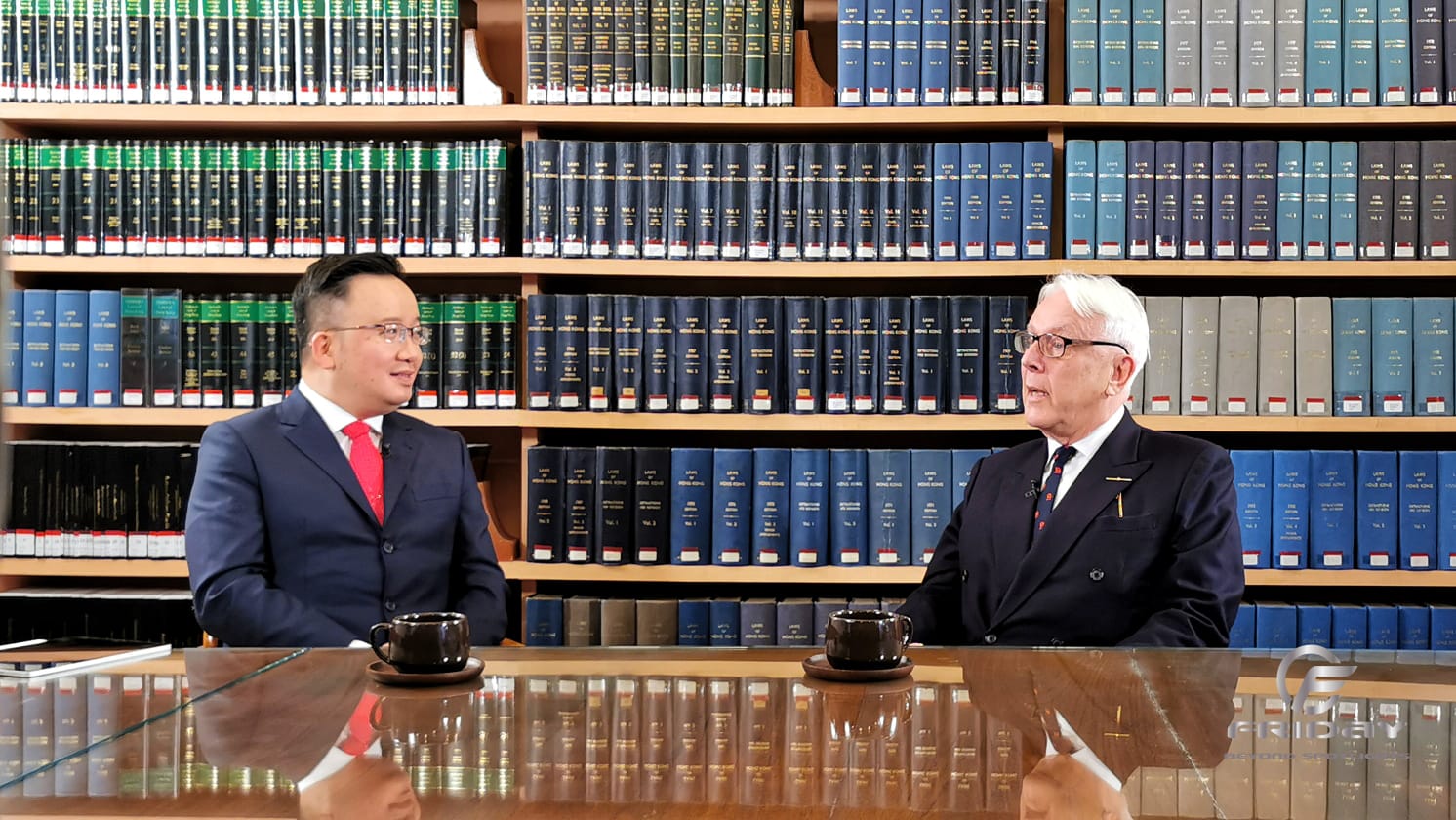- In at least one aspect, Hong Kong only fully gained the rule of law after the handover, says top barrister Grenville Cross
- Before 1997, his work took him to many places, including on a rather scary journey to Downing Street to see an ancient body of Law Lords
- The National Security Law in Hong Kong is misunderstood – it is “human rights-heavy” and used sparingly, the senior lawyer says
DID HONG KONG LOSE its rule of law after 1997? No. Technically speaking, that’s when it could be said to have gained the rule of law. By definition, statutes must apply to everyone – but during the British period, the Governor as the representative of the Queen of England was quite literally above the law. In contrast, post-colonial Hong Kong’s leaders can be arrested just like anyone else: so now, finally, Hong Kong has the rule of law for everyone.
That amusing observation was made by one of the city’s best known lawyers, Grenville Cross, in a TV interview on Friday Beyond Spotlights with Nick Chan Hiu-fung at the weekend.
The tale sums up the difference between the reality of law in today’s Hong Kong, and the negativity about it from critics. In international legal rankings, Hong Kong has been firmly in the world top twenty for many years. Yet critics regularly imply that rule of law in the city has been killed stone dead, pointing to the introduction of a Western-style security law in 2020 as evidence.
They’re wrong. Hong Kong has maintained its position. And critics apparently haven’t read the law they criticize. In truth, the National Security Law is “human rights heavy”, Cross said. And it is sparingly applied. “Only very few people have been actually been prosecuted under the National Security Law,” he said. “As of November, I think 155 had been arrested and only about 100 have been charged. But only a handful of those—three, four or five—have actually gone to court for trial. So it’s still extremely early days.”
Hong Kong courts tend to go the extra mile on behalf of defendants, and Cross feels that this stance is positive for justice. “The courts lean over backwards to be fair to people who are convicted of criminal offences, which is a very good thing,” he said.
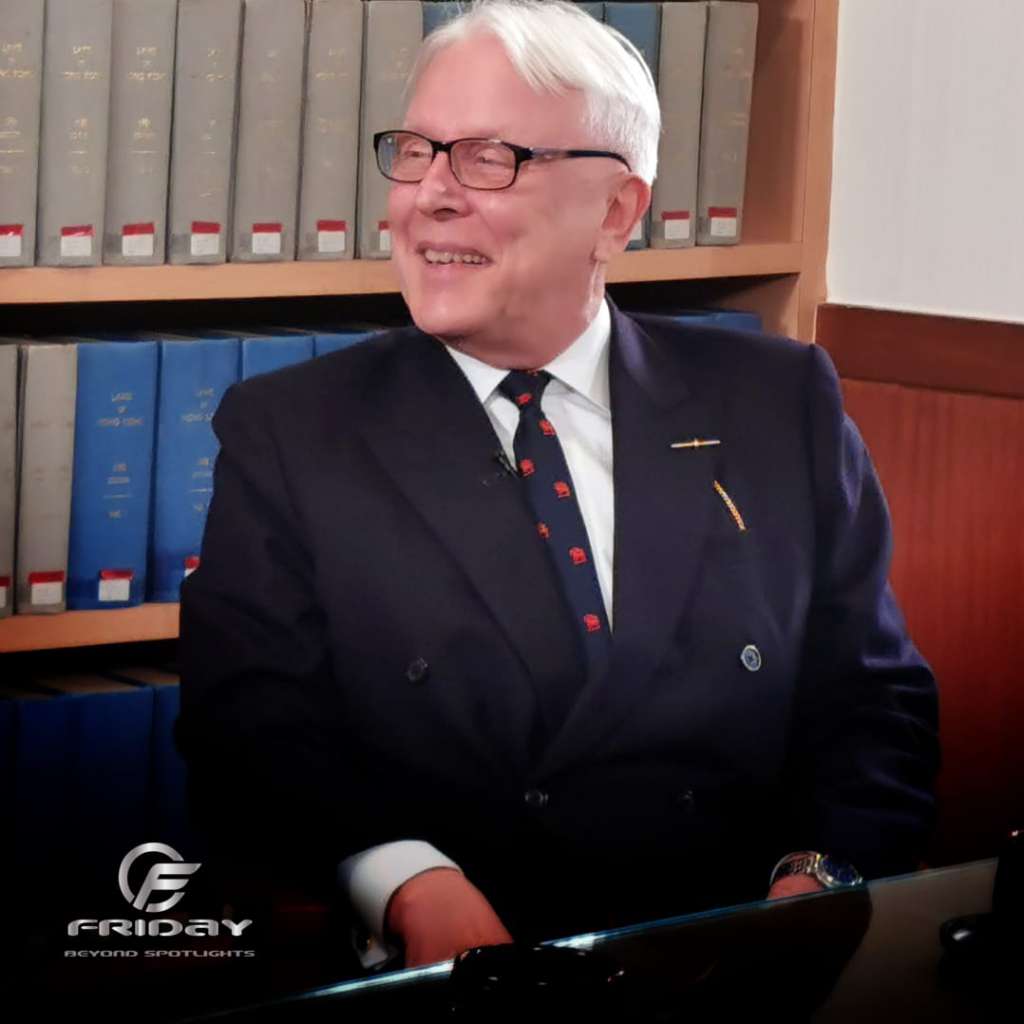
A TRIP TO DOWNING STREET
The law in Hong Kong has functioned extremely well compared to most other places in Asia, both before and after the handover. Yet there were many oddities in the pre-1997 period that have been fixed. For example, the final arbiter in the Hong Kong legal system used to be literally 9,600 kilometers away. And there’s a story to be told there.
In 1988, a court decision was made in a triad-related case that this city’s legal department felt was unfair to the people of Hong Kong. Grenville Cross was tasked with getting it fixed.
That meant getting on an aircraft to London and heading in the direction of 10, Downing Street, the most famous address in the UK. Cross had to walk past the Prime Minister’s official residence to go to the house next door, where the scarily named Law Lords could be found. They were part of the Privy Council, an ancient body of “advisors to the Sovereign”.
“It was over-awe-ing and very nerve-wracking but it was fascinating to appear before the Law Lords and to put the Hong Kong case for the then Legal Department of Hong Kong,” he said.
Cross then had to wait for a whole month before hearing the Law Lords’ decision. “We won the case,” he said. “Yes, I was very very very chuffed with that.” His father gave him a pocket watch to celebrate his winning of a mega-case.
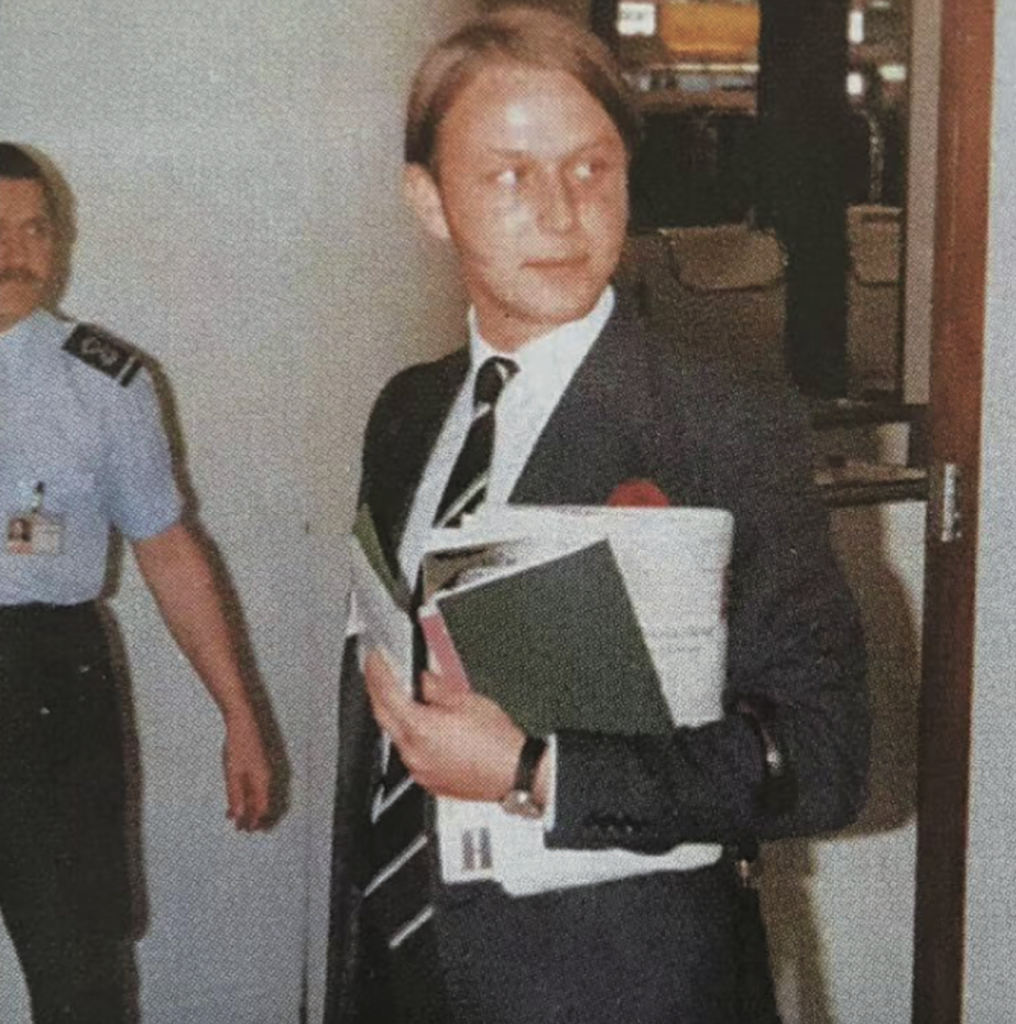
A MORE LOGICAL SYSTEM
Since China’s resumption of sovereignty over Hong Kong, the system is far more logical, with Court of Final Appeal cases heard in the city itself. And there has been no lowering of the high legal standards – an international committee of judges specializing in the Common Law fly in from around the world to ensure the highest quality of judgments. Until recently, two of the highest-ranking British judges were on that team. While political machinations from UK may have caused their withdrawal, the majority of international judges have chosen to stand strong with the people and the legal sector of Hong Kong.
Despite a long series of small blows like this, Hong Kong will not just survive but thrive, Cross believes. People want stability – and so do businesses. The people and the system in Hong Kong is high functioning and delivers. The rule of law “is the secret to Hong Kong’s great success over the years both before 1997 and after 1997,” he said.
“Its key elements are such things as an independent judiciary, a strong legal profession, people who are committed to the well-being of Hong Kong, independence in all areas that people are involved in legal work, a respect for legal traditions, and a belief in the system of precedent, which is very much a part of the common law, and provides for certainty in the interpretation of the law and the respect for legal values.”
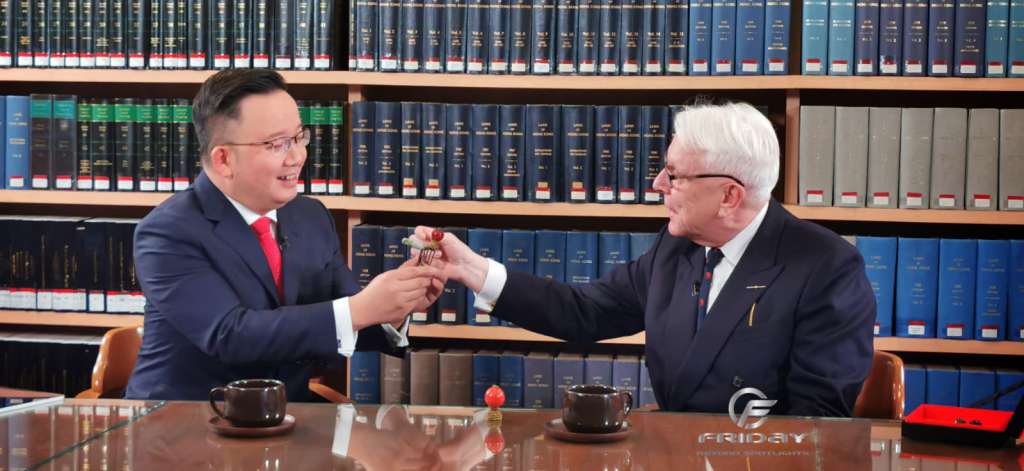
On a more personal note, Grenville Cross is fascinated with Hong Kong and mainland China history — and has a collection of the colored globes that sat atop the hats of mandarins during the Qing Dynasty.
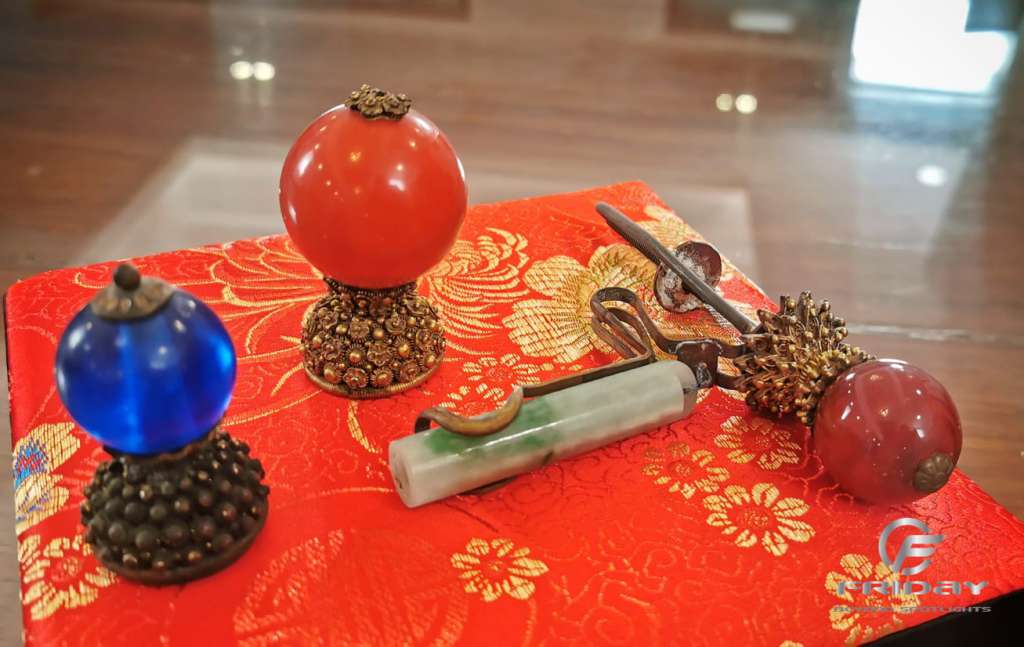
MOVING BEYOND 2047
Like Teresa Cheng Yeuk-wah, Secretary for Justice, Cross sees the Common Law continuing past 2047, the minimum period for Hong Kong to retain its own economic and legal systems. Maintaining it would be the best option for everyone – for Hong Kong, for Mainland China, and for the international community.
After he left the Department of Justice in Hong Kong, he became an international prosecutor with the International Association of Prosecutors. And today, despite having reached the age of 70, he is as active as ever. He is currently vice chairman of the association’s senate. He is also an academic, and a popular writer: his speedily written columns, correcting the errors made by a press which tends to be hostile to Hong Kong, are widely shared.
Ultimately, he feels that the National Security Law has been a key contributor to the return of peace and stability to the city’s populace. And it has done this while clearly retaining the classic protections of the Common Law. “And that, of course, is profoundly reassuring for the people of Hong Kong.”
Continuity seems to be the underlying message of many of Grenville Cross’s writings. And in illustration of that, he still has the pocket watch his father gave him after winning his case in front of the Law Lords.
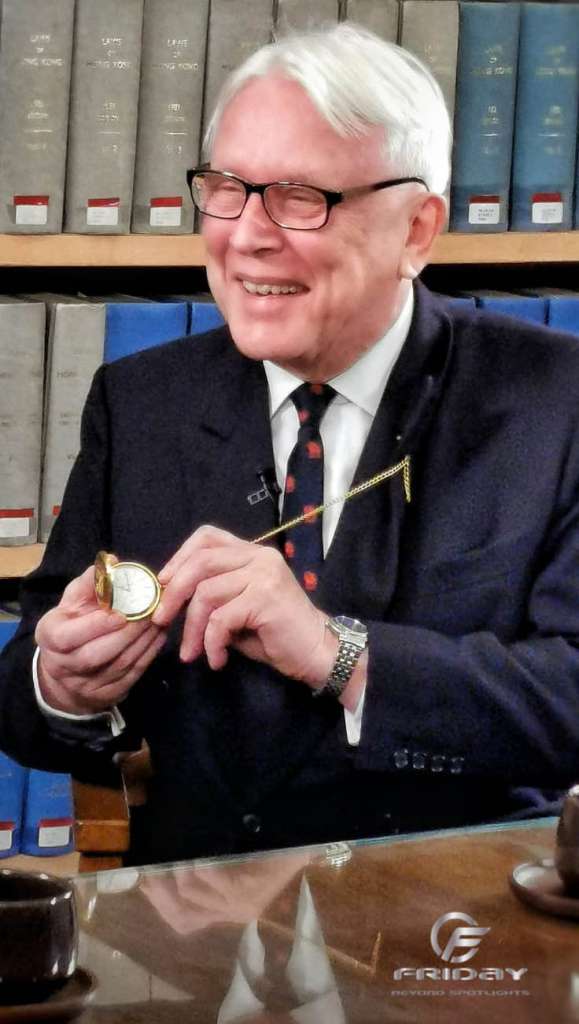
Grenville Cross was taking to Nick Chan Hiu-fung in Friday Beyond Spotlights.
Season One of Friday Beyond Spotlights is hosted by Patrick Tsang On-yip, Vice-Chairman and Executive Director of i-Cable Communications and CEO and Director of Chow Tai Fook Enterprises; and Nick Chan Hiu-fung, a lawyer and elected lawmaker serving on the National People’s Congress.
All images from Friday Beyond Spotlights unless stated


